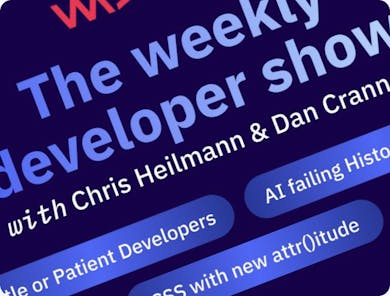Last Friday we sent out the 100th edition of the WeAreDevelopers Dev Digest newsletter in a brand new layout and with a different content structure. We based this on the results of the survey which we also published here earlier.
In addition to the changes to the newsletter itself, we’ll also publish a longer form version here in the magazine every Monday, so here goes.
News and Articles
One of the main things that happened was that the Macintosh computer turned 40 and it got a lot of praise for it “being different”. It’s also interesting to see how its look changed over the years.
Sticking with Apple news, the Verge has an interesting article on how the web will be the first killer app for the Vision Pro. I do hope that this will be the case, as closed environments are a big step back in software distribution.
In security news, it is interesting to see that there are quite a few Critical Vulnerabilities found in Open Source AI/ML Platforms. I am sure there are quite a few in the closed platforms, too, but my hopes are that they get fixed faster in the open space.
Web Development links
When it comes to web development, we had a few interesting topics. One was Paul Lewis delivering lots of details on browser rendering performance. This is a tricky topic and we love that Google provides such in-depth articles.
Stephanie Eckles writes about 12 CSS One-Line Upgrades to your styles. CSS moves fast and - yes - it is a proper programming language by now. So this is a great opportunity to brush up your styles.
JavaScript is the most used language still, and its versatility makes it possible to use it in all kinds of environments. One thing that was unduly hard was Shell Scripting in JavaScript, which is why I resort to looking up Bash syntax all the time or use PHP instead. The Bun Shell tries to make it easier to use JavaScript on the shell.
Sometimes the success of a developer product is a readme file that doesn’t only provide the information but also looks and works great. GrahamTheDev's excellent tutorial on how to generate a high fidelity GitHubReadMe including responsive graphics and dark and light mode.
And finally, Pier-Luc Brault used Netscape Composer in 2024. This took me way back as I also started with this and it made me learn HTML instead.
Work and productivity links
The GitHub team is on fire, releasing one after another great articles lately. 10 unexpected ways to use GitHub Copilot lists a lot of things that used to be experimental, but are now part of the core product. This includes creating pull requests, Copilot on the command line helping you with bash scripting and more.
Anton Zaides writes about the fact that hiring only seniors is the worst policy. I have to agree that there should be more focus on investing in people to learn in your company. Leah Tharin muses about the skill that gets you fired or promoted: managing up and Eugene Shulga shares key lessons learned on his path from Engineer to VP.
Finally we have a repository with tips and resources to prepare for behavioural interviews.
Tools
This time we covered two tools. The first one is remoteStorage, which combines the localStorage API with a remote server to persist data across browsers and devices. The second one is wacat, which randomly tests your products as if a cat ran around on your keyboard. I love stress-testing tools like this. The web is messy and why not have a simulated cat show you what end users could do?
The joy of the internet links
I love the web and I love when you come across fun and informative things that would never exist as an app. So here are some of them.
The Web Design History Timeline shows milestones from 1990 to the present, including tools being released and new technologies cropping up. The 3D Trunk Road Gritter Tracker shows live information about roads being made safer in Scotland with the best truck names ever (although David Ploughie is missing). Map mashups were a cool thing some time ago and I wished they came back. And ever since Boaty McBoatface we know that the British public has a great sense of humour when it comes to naming things.
And finally, one of the weirder things about World War 2 is that the British built the first computer to crack the encoded messages of the Germans. Instead of boasting about it, it kind of fell into oblivion and whilst you can visit a replica in England there weren’t many photos of the original available. This changed now and you can see what the machine called Colossus looked like.
Videos
This time we sat down for a coffee with Ulrich Irnich, Chief Information Officer at Vodafone, to talk about how AI influences the telecommunication industry, his professional journey, his take on the importance of purpose in life and in the workplace as well key insights from his experience as a CIO at Vodafone.
Furthermore, we had Sascha from Hoffmann Group answering 3 questions for developers (1m11s), we have a YouTube video on Every Logical Fallacy Explained (11m) for you to name the weird things in your next meeting and we had two videos from the WeAreDevelopers watch section. Johannes Bechberger - Exploring Java Debugger Internals (58m) and Stefan Baumgartner on Rust as a Spotless Programming Language (60m).
Want to get this earlier?
That's all for this time. The Dev Digest get published every Friday morning, so if you want this in your inbox, why not subscribe?









